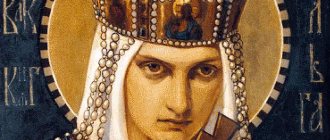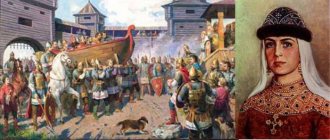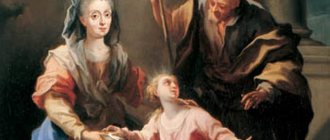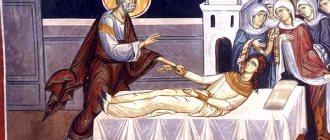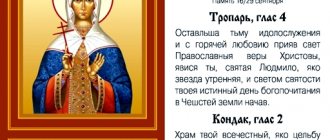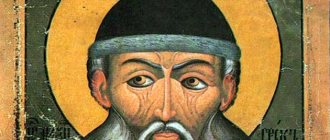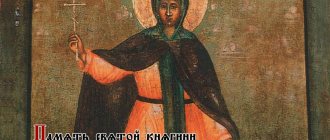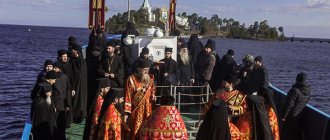This beautiful and proud woman suffered a difficult fate. Early marriage, the death of her husband Igor, and constant internecine war made her powerful and courageous. During the reign of her son Svyatoslav, anti-Christian unrest broke out here and there. The princess, who converted to Christianity in Greece, secretly supported priests, however, when the princess’s days were numbered, she regained her former firmness.
The greatest woman of all times, the Equal-to-the-Apostles princess, ruler of Rus' and her first saint, remained in the memory of generations as a holy and wise woman.
Biography
Princess Olga, wife of the great Russian prince Igor Rurikovich, mother of Svyatoslav Igorevich, ruled Russia from 945 to 960. At birth, the girl was given the name Helga, her husband called her by his own name, but the female version, and at baptism she began to be called Elena. Olga is known for being the first of the rulers of the Old Russian state to voluntarily convert to Christianity.
Portrait of Princess Olga
Dozens of films and TV series have been made about Princess Olga. Her portraits are in Russian art galleries; based on ancient chronicles and found relics, scientists have tried to recreate a photographic portrait of the woman. In his native Pskov there is a bridge, an embankment and a chapel named after Olga and two of her monuments.
Moscow's first church in honor of Saint Princess Olga was consecrated in Ostankino
Estimated reading time: 1 min.
The new church is the Patriarchal Metochion in Ostankino (Trinity Deanery of the North-Eastern Vicariate of Moscow), reports the Patriarchia.ru website.
In the co-service of the capital's clergy and with the blessing of Patriarch Kirill , the temple was consecrated with a great rite by Metropolitan Arseniy , who then led the Liturgy there.
Metropolitan Arseny handed over the Patriarchal gift to the newly consecrated church - an icon of the Holy Apostle Andrew the First-Called and the Holy Equal-to-the-Apostles Prince Vladimir .
In turn, on behalf of the parish, Father Philip gave Patriarch Kirill an embroidered icon of the Holy Princess Olga.
The temple with five domes, a hipped roof and a belfry was built according to an individual project, which embodied the best traditions of ancient Russian architecture.
Currently, regular services are held in the temple; it is open daily from 9:00 to 20:00. It runs a Sunday school for children, choral singing clubs for children and adults, a children's dance club and floristry courses.
Note that in Moscow there are chapels and a house church in honor of Equal-to-the-Apostles Olga, but the new church was the first such large-scale complex in honor of the holy princess.
Source
Childhood and youth
The exact date of Olga’s birth has not been preserved, but the Degree Book of the 17th century says that the princess died at eighty years old, which means she was born at the end of the 9th century. If you believe the “Arkhangelsk Chronicler”, the girl got married when she was ten years old. Historians are still arguing about the year of birth of the princess - from 893 to 928. The official version is recognized as 920, but this is the approximate year of birth.
Princess Olga in her youth
The oldest chronicle “The Tale of Bygone Years,” describing the biography of Princess Olga, indicates that she was born in the village of Vybuty, Pskov. The names of the parents are not known, because... they were peasants, and not persons of noble blood.
The story of the late 15th century says that Olga was the daughter of the Prophetic Oleg, who ruled Russia until Igor, the son of Rurik, grew up. He, according to legend, married Igor and Olga. But this version of the princess’s origin has not been confirmed.
Governing body
At the moment when the Drevlyans killed Olga’s husband, Igor, their son Svyatoslav was only three years old. The woman was forced to take power into her own hands until her son grew up. The first thing the princess did was take revenge on the Drevlyans.
Immediately after the murder of Igor, they sent matchmakers to Olga, who persuaded her to marry their prince, Mal. So the Drevlyans wanted to unite the lands and become the largest and most powerful state of that time.
Princess Olga meets the body of Prince Igor
Olga buried the first matchmakers alive along with the boat, making sure that they understood that their death was worse than Igor’s. The princess sent a message to Mal that she was worthy of the best matchmakers from the strongest men in the country. The prince agreed, and the woman locked these matchmakers in the bathhouse and burned them alive while they washed themselves to meet her.
Later, the princess came with a small retinue to the Drevlyans to, according to tradition, celebrate a funeral feast at the grave of her husband. During the funeral feast, Olga drugged the Drevlyans and ordered the soldiers to cut them down. The chronicles indicate that the Drevlyans then lost five thousand soldiers.
In 946, Princess Olga went into open battle on the land of the Drevlyans. She captured their capital and, after a long siege, using cunning (with the help of birds with incendiary mixtures tied to their paws), she burned the entire city. Some of the Drevlyans died in the battle, the rest submitted and agreed to pay tribute to Rus'.
“Olga’s Revenge against the Drevlyan Idols”, artist F.A. Bruni, 1839
Since Olga’s grown son spent most of his time on military campaigns, power over the country was in the hands of the princess. She carried out many reforms, including the creation of centers of trade and exchange, which made it easier to collect taxes.
Thanks to the princess, stone construction was born in Rus'. Having seen how easily the wooden fortresses of the Drevlyans burned, she decided to build her houses from stone. The first stone buildings in the country were the city palace and the ruler's country house.
Olga established the exact amount of taxes from each principality, the date of their payment and frequency. They were then called “polyudya”. All lands subject to Kyiv were obliged to pay it, and a princely administrator, a tiun, was appointed in each administrative unit of the state.
Duchess Olga
In 955, the princess decided to convert to Christianity and was baptized. According to some sources, she was baptized in Constantinople, where she was personally baptized by Emperor Constantine VII. During baptism, the woman took the name Elena, but in history she is still better known as Princess Olga.
She returned to Kyiv with icons and church books. First of all, the mother wanted to baptize her only son Svyatoslav, but he only mocked those who accepted Christianity, but did not forbid anyone.
During her reign, Olga built dozens of churches, including a monastery in her native Pskov. The princess personally went to the north of the country to baptize everyone. There she destroyed all pagan symbols and installed Christian ones.
Holy Princess Olga
The vigilantes reacted to the new religion with fear and hostility. They emphasized their pagan faith in every possible way, tried to convince Prince Svyatoslav that Christianity would weaken the state and should be banned, but he did not want to contradict his mother.
Olga was never able to make Christianity the main religion. The warriors won, and the princess had to stop her campaigns, locking herself in Kyiv. She raised Svyatoslav's sons in the Christian faith, but did not dare to baptize, fearing the wrath of her son and the possible murder of her grandchildren. She secretly kept a priest with her so as not to give rise to new persecution of people of the Christian faith.
Temple of Princess Olga in Kyiv
There is no exact date in history when the princess handed over the reins of government to her son Svyatoslav. He often went on military campaigns, therefore, despite the official title, Olga ruled the country. Later, the princess gave her son power in the north of the country. And, presumably, by 960 he became the ruling prince of all Rus'.
Olga's influence will be felt during the reign of her grandchildren Yaropolk Svyatoslavich and Vladimir Svyatoslavich. They were both raised by their grandmother, from infancy they became accustomed to the Christian faith and continued the formation of Rus' on the path of Christianity.
Igor's campaign
To tell this story, we should start with the last campaign of her husband, Prince Igor. The entry for 945 says that the squad began to complain to Igor that the “youths of Sveneld”, that is, the people who made up the inner circle of his governor Sveneld, were all “dressed in weapons and clothes,” while Igor’s warriors themselves were “naked” . It is unlikely that the prince’s warriors were so “naked” that it was worth talking about this seriously, but in those days they tried not to argue with the squad, since it depended on it whether the prince would sit on the Kiev throne. Therefore, Igor went to the Drevlyans, a tribe that lived in the territory of Ukrainian Polesie, and carried out a pogrom, adding new payments to the previous tribute in order to cover up the blatant nakedness of his warriors. Having collected this tribute, he went home, but on the way, apparently, he decided that the cunning Drevlyans had hidden something somewhere. Having sent the bulk of his people home, he and a small retinue returned to the Drevlyan capital Iskorosten, “wishing more wealth.” This was his mistake. The Drevlyans, led by their prince Mal, repulsed him, killed all the soldiers, and subjected Igor himself to a terrible execution - they tore him to pieces, tying him by his legs to the tops of two bent trees.
Personal life
According to the Tale of Bygone Years, the Prophetic Oleg married Olga and Igor when they were still children. The story also says that the wedding took place in 903, but, according to other sources, Olga was not even born then, so there is no exact date of the wedding.
Princess Olga and Igor Rurikovich
There is a legend that the couple met at a crossing near Pskov, when the girl was a boat carrier (she dressed in men's clothes - this was a job only for men). Igor noticed the young beauty and immediately began to pester her, to which he received a rebuff. When the time came to get married, he remembered that wayward girl and ordered to find her.
If you believe the chronicles describing the events of those times, then Prince Igor died in 945 at the hands of the Drevlyans. Olga came to power while her son grew up. She never married again, and there is no mention of relationships with other men in the chronicles.
Prayers before the icon
First prayer
Oh, holy Equal-to-the-Apostles Grand Duchess Olgo, First Lady of Russia, warm intercessor and prayer worker for us before God! We come running to you with faith and pray with love: be your helper and helper in all things for our good, and, just as in your earlier life you tried to enlighten our forefathers with the light of holy faith and tradition I will do the will of the Lord, so even now, in the Heavenly Lordship, you remain favorable With your prayers to God, help us in enlightening our minds and hearts with the light of the Gospel of Christ, so that we may advance in faith, piety and love of Christ. In poverty and sorrow, present consolation, give a helping hand to those in need, intercede for those who are offended and attacked, those who have gone astray from the right faith and those blinded by heresies to their understanding and ask us from the Almighty of God, all that is good and useful to life, temporal and eternal, so that having lived here well, we will be worthy of inheriting eternal blessings in the endless Kingdom of Christ our God, to Him together with the Father and the Holy Spirit belongs all glory, honor and worship always, now and ever and unto the ages of ages. Amen.
Second prayer
Oh, great saint of God, God-chosen and God-glorified, equal to the apostles Grand Duchess Olgo! You rejected pagan evil and wickedness, you believed in the One True Trinitarian God, and you received holy Baptism, and you laid the foundation for the enlightenment of the Russian land. volume of faith and piety. You are our spiritual ancestor, you, according to Christ our Savior, are the first culprit of enlightenment and salvation of our race. You are a warm prayer and intercessor for the Fatherland of the All-Russians, the army and all people. For this reason, we humbly pray to you: look at our weaknesses and beg the Most Merciful King of Heaven, may he not be so angry with us, because through our weaknesses we sin all day long, and may he not destroy us with the iniquities. we, but may He have mercy and save us by His mercy, may He plant His saving fear in our hearts, may He enlighten our minds with His grace, so that we may understand the ways of the Lord, leave the paths of wickedness and error, and strive steadily in the paths of salvation and truth To fulfill the commandments of God and the statutes of the Holy Church. Pray, blessed Olgo, to the Lover of Mankind, may He add His great mercy to us, may He deliver us from the invasion of foreigners, from internal disorder, rebellion and strife, from famine, deadly diseases and from all Who is evil, may he give us the blessing of the air and the fruitfulness of the earth, yes will preserve our country from all the snares and slander of the enemy, may he preserve truth and mercy in judges and rulers, may he give zeal to the shepherds for the salvation of his flock, may he give haste to all people to serve diligently correct your own, love each other and have like-mindedness, for the good of the Fatherland and the Holy Church, let us strive faithfully, so that the light of saving faith will shine in our country in all its ends, so that non-believers will turn to the faith, and all heresies and schisms will be abolished. Yes, having lived in peace on earth, we will be made worthy of eternal bliss in Heaven, praising and exalting God forever and ever. Amen.
Source
Death
Olga died of illness and old age, and was not killed, like many rulers of that time. The chronicles indicate that the princess died in 969. In 968, the Pechenegs raided Russian lands for the first time, and Svyatoslav went to war. Princess Olga and her grandchildren locked themselves in Kyiv. When the son returned from the war, he lifted the siege and wanted to immediately leave the city.
Monument to Princess Olga in Kyiv
His mother stopped him, warning him that she was very ill and felt her own death approaching. She turned out to be right; 3 days after these words, Princess Olga died. She was buried according to Christian customs, in the ground.
In 1007, the grandson of the princess, Vladimir I Svyatoslavich, transferred the relics of all the saints, including the remains of Olga, to the Church of the Holy Mother of God in Kyiv, which he founded. The official canonization of the princess took place in the middle of the 13th century, although miracles were attributed to her relics long before that, she was revered as a saint and called equal to the apostles.
Olga's second revenge
After this, the princess sent an ambassador to Mal with a request to send her the best people for matchmaking, so that the people of Kiev could see what honor they were showing her, otherwise they might resist and not let the princess go to Iskorosten. Mal, not suspecting a trick, immediately equipped a large embassy. When the matchmakers arrived in Kyiv, Olga, as befits a hospitable hostess, ordered a bathhouse to be prepared for them so that the guests could wash themselves off the road. And as soon as the Drevlyans began to wash, the doors of the bathhouse were propped open from the outside, and the bathhouse itself was set on fire from four sides.
Memory
- Olginskaya street in Kyiv
- St. Olginsky Cathedral in Kyiv
Movie
- 1981 – ballet “Olga”
- 1983 – film “The Legend of Princess Olga”
- 1994 – cartoon “Pages of Russian History. Land of the ancestors"
- 2005 – film “The Saga of the Ancient Bulgars. The Legend of Olga the Saint"
- 2005 – film “The Saga of the Ancient Bulgars. Vladimir's ladder "Red Sun"
- 2006 – “Prince Vladimir”
Literature
- 2000 – “I know God!” Alekseev S. T.
- 2002 - “Olga, Queen of the Rus.” Boris Vasiliev
- 2009 - “Princess Olga”. Alexey Karpov
- 2015 - “Olga, forest princess.” Elizaveta Dvoretskaya
- 2016 — “United by Power.” Oleg Panus
